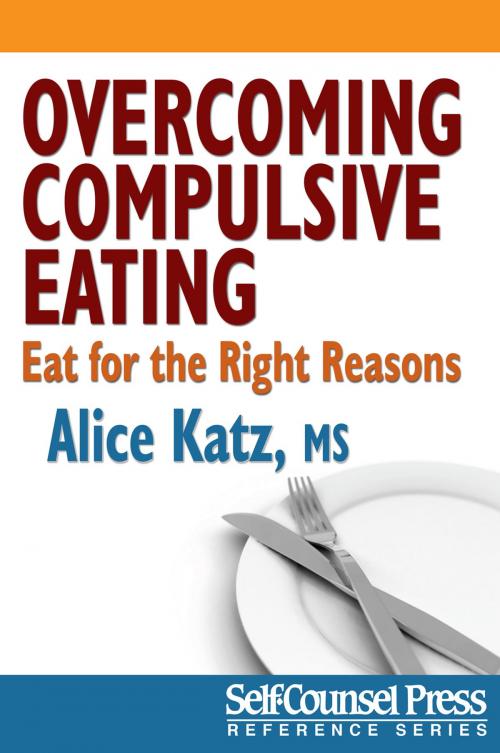Overcoming Compulsive Eating
Eat for the Right Reasons
Nonfiction, Health & Well Being, Psychology, Compulsive Behaviour, Health, Nutrition & Diet, Diets| Author: | Alice J. Katz | ISBN: | 9781770407961 |
| Publisher: | Self-Counsel Press | Publication: | October 15, 2013 |
| Imprint: | Self-Counsel Press | Language: | English |
| Author: | Alice J. Katz |
| ISBN: | 9781770407961 |
| Publisher: | Self-Counsel Press |
| Publication: | October 15, 2013 |
| Imprint: | Self-Counsel Press |
| Language: | English |
WHAT IS COMPULSIVE EATING? Compulsive eating is just one type of addictive behavior. Alcoholism, drug abuse, smoking, and caffeine use are other common additions. Both psychological and chemical factors contribute to them. Using these substances triggers a physical desire for more, and overuse leads to physical dependency. Some compulsive behaviors have a psychological basis only. For example, compulsive spenders buy on impulse and cannot save their money. Compulsive gamblers don't stop when they run out of money; they may steal to continue. Compulsive cleaners become upset by any disarray and spend hours keeping everything in order. Compulsive savers never throw anything out. Both psychological and chemical factors contribute to compulsive eating behavior. When you eat some chocolate, caffeine, or sugar your body needs more. Sugar and carbohydrates elevate your blood sugar level; when that level drops, your body needs more to elevate it again. However, despite the chemical factors that complicate compulsive eating, this behavior is primarily a psychological problem. Compulsive eating is any eating done in response to your mind instead of your body. Your body will respond to hunger and internal cues, but when you eat beyond the point of satisfaction, it is your mind that keeps you going. When the contributing psychological factors are very strong, even the knowledge that a certain food is harmful may not be enough to prevent your eating. Since total abstinence from food is impossible, compulsive eating is the most difficult addiction to overcome.
WHAT IS COMPULSIVE EATING? Compulsive eating is just one type of addictive behavior. Alcoholism, drug abuse, smoking, and caffeine use are other common additions. Both psychological and chemical factors contribute to them. Using these substances triggers a physical desire for more, and overuse leads to physical dependency. Some compulsive behaviors have a psychological basis only. For example, compulsive spenders buy on impulse and cannot save their money. Compulsive gamblers don't stop when they run out of money; they may steal to continue. Compulsive cleaners become upset by any disarray and spend hours keeping everything in order. Compulsive savers never throw anything out. Both psychological and chemical factors contribute to compulsive eating behavior. When you eat some chocolate, caffeine, or sugar your body needs more. Sugar and carbohydrates elevate your blood sugar level; when that level drops, your body needs more to elevate it again. However, despite the chemical factors that complicate compulsive eating, this behavior is primarily a psychological problem. Compulsive eating is any eating done in response to your mind instead of your body. Your body will respond to hunger and internal cues, but when you eat beyond the point of satisfaction, it is your mind that keeps you going. When the contributing psychological factors are very strong, even the knowledge that a certain food is harmful may not be enough to prevent your eating. Since total abstinence from food is impossible, compulsive eating is the most difficult addiction to overcome.















